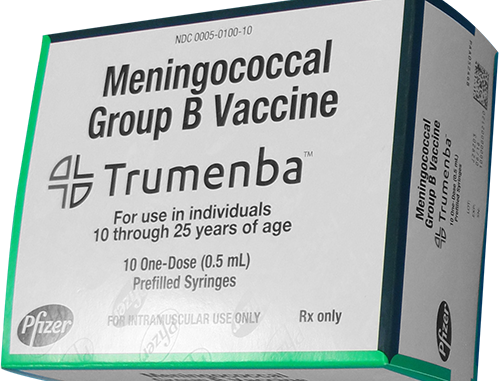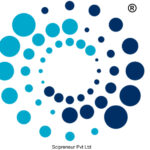
Pfizer’s Trumenba® Approved By European Commission For Meningococcal Group B Disease
TRUMENBA Approved in Europe with Option for a Two- or Three-Dose Schedule
TRUMENBA Approved in Europe with Option for a Two- or Three-Dose Schedule
“The approval of TRUMENBA reflects our dedication to advancing novel vaccines that can help protect adolescents and young adults, a population at an increased risk for meningococcal disease caused by MenB,” said Luis Jodar, Chief Medical and Scientific Affairs Officer, Medicines Development, Scientific and Clinical Affairs, Pfizer Vaccines. “Though uncommon, MenB disease is unpredictable, can progress rapidly and is associated with a significant risk of death and long-term disability, demonstrating the value of immunization as a preventive measure.”
Meningococcal Group B (MenB) is Responsible for 60 Percent of Meningococcal Disease Cases in Adolescents and Young Adults in Europe
Meningococcal Group B (MenB) is Responsible for 60 Percent of Meningococcal Disease Cases in Adolescents and Young Adults in Europe
Early symptoms can be misinterpreted as the flu, but meningococcal disease can lead to death within 24 hours.3 Despite antibiotic treatment, 10 to 15 percent of people with meningococcal disease will die.3 Of those adolescents who survive, three in five experience significant physical and mental disabilities.4 Adolescents remain a very important group for vaccination, as up to a quarter may be asymptomatic carriers of Neisseria meningitidis.5
“We are steadfast in our commitment to progress and shape the future of vaccines to help address serious health threats worldwide and make the greatest public impact,” said Susan Silbermann, President and General Manager, Pfizer Vaccines. “We are also focused on consistent, reliable supply for all the vaccines we manufacture, including a full 36-month shelf life with TRUMENBA. With the EC approval of TRUMENBA, Pfizer now has a comprehensive portfolio of vaccines to help prevent five of the most common disease-causing meningococcal serogroups in this region.”

Pfizer continues to invest significantly in manufacturing processes and facilities to ensure a sufficient supply of TRUMENBA in Europe, where the majority of meningococcal disease cases (60 percent) among adolescents and young adults are caused by serogroup B.1
The EC decision is based on results from a clinical development program in which more than 20,000 adolescents and adults were evaluated, approximately 15,000 of whom received TRUMENBA.6,7,8,9,10,11,12 The data demonstrate that TRUMENBA induces protective serum bactericidal antibody responses to diverse MenB test strains that are representative of disease causing strains, and the vaccine has an established safety profile.13 In clinical studies, the most common adverse reactions observed were injection site pain, redness and swelling at the vaccination site, headache, fatigue, chills, diarrhea, muscle pain, joint pain and nausea. The posology includes both two- and three-dose schedules, providing flexibility for healthcare professionals to administer the vaccine depending on individuals’ risk of exposure and susceptibility to MenB. The marketing authorization granted by the EC is valid in all European Union (EU) member states, plus Iceland, Liechtenstein and Norway. Additional marketing authorization application reviews for TRUMENBA are under way in other countries.
Pfizer’s Meningococcal Vaccines portfolio includes vaccines that help protect against five of the most common disease-causing serogroups — A, B, C, W, and Y (approvals varying by country) — which can threaten the health of people at various points in their lives.14 Since its first approval in the U.S. in 2014, TRUMENBA has been administered to an estimated 600,000 adolescents and young adults.15 The risk of contracting meningococcal disease varies year to year, by age group, and by the country one travels to or lives in.16
EU Indication for TRUMENBA® (Meningococcal Group B Vaccine)
TRUMENBA® (Meningococcal Group B Vaccine) is indicated for active immunization of individuals 10 years and older to prevent invasive meningococcal disease caused by Neisseria meningitidis serogroup B.
EU Important Safety Information
Hypersensitivity to the active substances or to any of the excipients is a contraindication.
Severe allergic reaction (e.g., anaphylaxis) after any previous dose of TRUMENBA or to any component of this vaccine is a contraindication.
Immunocompromised persons, including individuals receiving immunosuppressant therapy, may have a diminished immune response to TRUMENBA.
As with any vaccine, vaccination with TRUMENBA may not protect all vaccine recipients.
In clinical studies, the most common adverse reactions observed were injection site pain, redness and swelling at the vaccination site, headache, fatigue, chills, diarrhea, muscle pain, joint pain and nausea.
There are no data from the use of TRUMENBA in pregnant women. TRUMENBA should be used during pregnancy only if clearly needed.
U.S. Indication for TRUMENBA® (Meningococcal Group B Vaccine)
TRUMENBA® (Meningococcal Group B Vaccine) is a vaccine indicated for individuals 10 through 25 years of age for active immunization to prevent invasive disease caused by Neisseria meningitidis group B.
The effectiveness of the two-dose schedule of TRUMENBA against diverse Neisseria meningitidis serogroup B strains has not been confirmed.
U.S. Important Safety Information
TRUMENBA® (Meningococcal Group B Vaccine) should not be given to anyone with a history of a severe allergic reaction after a previous dose of TRUMENBA.
Individuals with weakened immune systems may have a reduced immune response.
The most common adverse reactions in adolescents and young adults were pain at the injection site, fatigue, headache, and muscle pain.
Data are not available on the safety and effectiveness of using TRUMENBA and other meningococcal group B vaccines interchangeably to complete the vaccination series.
Tell your healthcare provider if you are pregnant, or plan to become pregnant.
Ask your healthcare provider about the risks and benefits of TRUMENBA. Only a healthcare provider can decide if TRUMENBA is right for you or your child.
You are encouraged to report negative side effects of vaccines to the U.S. Food and Drug Administration (FDA) and the Centers for Disease Control and Prevention (CDC). Visit www.vaers.hhs.gov or call 1-800-822-7967.
For the full prescribing information for TRUMENBA, please visit www.trumenba.com.
About TRUMENBA® (Meningococcal Group B Vaccine)
TRUMENBA® (Meningococcal Group B Vaccine) was first introduced in the United States in October 2014 for active immunization to prevent invasive disease caused by Neisseria meningitidis serogroup B in individuals 10 through 25 years of age.
TRUMENBA is a sterile suspension composed of two recombinant lipidated factor H binding protein (fHBP) variants from N. meningitidis serogroup B, one from fHBP subfamily A and one from subfamily B (A05 and B01, respectively). fHBP is one of many proteins found on the surface of meningococci and contributes to the ability of the bacterium to avoid host defenses. fHBPs can be categorized into two immunologically distinct subfamilies, A and B.17 The susceptibility of serogroup B meningococci to complement-mediated, antibody-dependent killing following vaccination with TRUMENBA is dependent on both the antigenic similarity of the bacterial and vaccine fHBPs, as well as the amount of fHBP expressed on the surface of the invading meningococci.18
As with any vaccine, TRUMENBA may not prevent disease in all vaccinated individuals. The frequency of meningococcal disease caused by serogroup B varies geographically, and could influence the ability to evaluate effectiveness of the vaccine in any given country. Based on the low incidence of meningococcal disease, placebo-controlled clinical trials for TRUMENBA were considered unfeasible due to the size of the study that would be required and were not performed. Licensure of TRUMENBA was based on demonstration of immune responses measured using a serum bactericidal assay with human complement (hSBA).
About Meningococcal Disease
Meningococcal disease can affect anyone, at any age. The reported incidence of invasive meningococcal disease (IMD) varies by region, ranging from less than 0.5 cases per 100,000 in North America and just under 1 case per 100,000 in Europe, and up to 10-1,000 cases per 100,000 during epidemic years in Africa.19 The majority of invasive meningococcal disease cases worldwide can be attributed to six Neisseria meningitidis serogroups (A, B, C, W-135, X and Y).19 Together serogroups A, B, C, W-135, and Y account for 90% of all invasive meningococcal disease.14
Meningococcal disease can progress rapidly, and symptoms are difficult to distinguish from other more common infections, with flu-like symptoms such as headache, nausea and vomiting among the earliest signs.3 The most common clinical presentations of meningococcal disease are meningitis and septicemia.3
Working together for a healthier world®
At Pfizer, we apply science and our global resources to bring therapies to people that extend and significantly improve their lives. We strive to set the standard for quality, safety and value in the discovery, development and manufacture of health care products. Our global portfolio includes medicines and vaccines as well as many of the world’s best-known consumer health care products. Every day, Pfizer colleagues work across developed and emerging markets to advance wellness, prevention, treatments and cures that challenge the most feared diseases of our time. Consistent with our responsibility as one of the world’s premier innovative biopharmaceutical companies, we collaborate with health care providers, governments and local communities to support and expand access to reliable, affordable health care around the world. For more than 150 years, we have worked to make a difference for all who rely on us. We routinely post information that may be important to investors on our website at www.pfizer.com. In addition, to learn more, please visit us on www.pfizer.com and follow us on Twitter at @Pfizer and @Pfizer_News, LinkedIn, YouTube and like us on Facebook at Facebook.com/Pfizer.
DISCLOSURE NOTICE: The information contained in this release is as of May 30, 2017. Pfizer assumes no obligation to update forward-looking statements contained in this release as the result of new information or future events or developments.
This release contains forward-looking information about TRUMENBA® (Meningococcal Group B Vaccine) and an approval for TRUMENBA in Europe for the prevention of meningococcal disease caused by Neisseria meningitidis serogroup B in individuals 10 years of age and older, including their potential benefits, that involves substantial risks and uncertainties that could cause actual results to differ materially from those expressed or implied by such statements. Risks and uncertainties include, among other things, uncertainties regarding the commercial success of TRUMENBA; the uncertainties inherent in research and development, including the ability to meet anticipated clinical trial completion dates and regulatory submission dates, as well as the possibility of unfavorable clinical trial results, including unfavorable new clinical data and additional analyses of existing clinical data; whether and when any biologics license applications may be filed in any other jurisdictions for TRUMENBA; whether and when regulatory authorities in any other jurisdictions where applications for TRUMENBA may be pending or filed may approve any such applications, which will depend on the assessment by such regulatory authorities of the benefit-risk profile suggested by the totality of the immunogenicity and safety information submitted; decisions by regulatory authorities regarding labeling and other matters that could affect the availability or commercial potential of TRUMENBA; and competitive developments.
A further description of risks and uncertainties can be found in Pfizer’s Annual Report on Form 10-K for the fiscal year ended December 31, 2016 and in its subsequent reports on Form 10-Q, including in the sections thereof captioned “Risk Factors” and “Forward-Looking Information and Factors That May Affect Future Results,” as well as in its subsequent reports on Form 8-K, all of which are filed with the U.S. Securities and Exchange Commission and available at www.sec.gov and www.pfizer.com.
1 European Centre for Disease Prevention and Control. Annual Epidemiological Report 2016 – Invasive meningococcal disease. Stockholm: ECDC; 2016.
2 Poland GA. Prevention of meningococcal disease: current use of polysaccharide and conjugate vaccines. Clin Infect Dis. 2010; 50; S45-S53.
3 Centers for Disease Control and Prevention. Meningococcal Vaccines for Preteens, Teens. http://www.cdc.gov/features/meningococcal/. Last Updated April 18, 2016. Accessed May 2017.
4 Borg J, Christie D, Coen PG, Pooy R, Viner RM. Outcomes of meningococcal disease in adolescence: prospective, matched-cohort study. Pediatrics. 2009; 123: e502-e509.
5 Christensen H, May M, Bowen L, Hickman M, Trotter C. Meningococcal carriage by age: a systematic review and meta-analysis. Lancet Infect Dis. 2010; 10(12):853-861.
6 ClinicalTrials.gov. A Trial to Assess the Safety, Tolerability and Immunogenicity of Repevax® and rLP2086 Vaccine When Given Together in Healthy Subjects Aged >=11 to <19 Years.http://clinicaltrials.gov/ct2/show/NCT01323270?term=B1971010&rank=1. Accessed March 12, 2015.
7 ClinicalTrials.gov. A Clinical Trial to Study the Safety, Tolerance and Immunogenic Response to Gardasil and Bivalent rLP2086 Vaccine When Given at the Same Time to Children Between the Ages of 11 and 17. http://clinicaltrials.gov/ct2/show/NCT01461993?term=B1971011&rank=1. Accessed March 12, 2015.
8 ClinicalTrials.gov. A Trial To Assess The Safety, Tolerability, And Immunogenicity Of Rlp2086 Vaccine When Administered In Either 2- Or 3-Dose Regimens In Healthy Subjects Aged ≥11 To <19 Years. http://clinicaltrials.gov/ct2/show/NCT01299480?term=B1971012&rank=1. Accessed March 12, 2015.
9 ClinicalTrials.gov. A Clinical Trial to Study the Safety, Tolerance and Immunogenic Response to MCV4, Tdap and Bivalent rLP2086 Vaccine When Given at the Same Time to Children Between the Ages of 10 Through 12 Years of Age. http://clinicaltrials.gov/ct2/show/NCT01461980?term=B1971015&rank=1. Accessed March 12, 2015.
10 ClinicalTrials.gov. A Trial to Assess the Lot Consistency, Safety, Tolerability and Immunogenicity of Bivalent rLP2086 Vaccine When Given to Healthy Subjects Aged ≥10 to <19 years.http://clinicaltrials.gov/ct2/show/NCT01830855?term=B1971009&rank=1. Accessed March 12, 2015.
11 ClinicalTrials.gov. A Global Phase 3 Safety Study of 120 mcg rLP2086 Vaccine in Adolescents and Young Adults Aged 10 to 25 Years. http://clinicaltrials.gov/ct2/show/NCT01352793?term=B1971014&rank=1. Accessed March 12, 2015.
12 ClinicalTrials.gov. A Trial to Assess the Safety, Tolerability, and Immunogenicity of Bivalent rLP2086 Vaccine When Given to Healthy Young Adults Aged >=18 to <26 Years. (B1971016).http://clinicaltrials.gov/ct2/show/NCT01352845?term=B1971016&rank=1. Accessed March 12, 2015.
13 Pfizer Data on File.
14 Kieny MP, Excier J, Girard M. Research and development of new vaccines against infectious diseases. Am J Public Health. 2004; 94(11): 1931-1935.
15 Internal calculations based on Quintiles IMS database. QuintilesIMS LifeLink Patient Data, including Rx, Dx and Specialty Pharmacy, full year 2014-2016.
16 Rouphael NG, Stephens DS. Neisseria meningitidis: biology, microbiology, and epidemiology. Methods Mol Biol. 2012; 799:1-20.
17 Shirley M, Dhillon S. Bivalent rLP2086 vaccine (Trumenba((R))): a review in active immunization against invasive meningococcal group B disease in individuals aged 10–25 years. BioDrugs. 2015 Oct; 29(5): 353-61. Available at: http://link.springer.com/article/10.1007%2Fs40259-015-0139-0. Accessed May 2017.
18 Murphy E, Andrew L, Lee KL et al. Sequence diversity of the factor H binding protein vaccine candidate in epidemiologically relevant strains of serogroup B Neisseria meningitidis. J Infect Dis. 2009 Aug 1; 200(3): 379-89. Available at https://doi.org/10.1086/600141. Accessed May 2017.
19 Halperin SA, et al. Vaccine 2012;30(2):B26–36.
EU Media:
Dervila Keane, +35386 2110834
dervila.keane@pfizer.com
or
Global Media:
Sally Beatty, 347-330-7867
sally.beatty@pfizer.com
or
Investors:
Bryan Dunn, 212-733-8917
bryan.dunn@pfizer.com







Leave a Reply